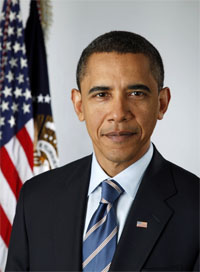Mid-day report: Wednesday morning Prop 8 trial

President Obama
Attorneys for Proposition 8 tried to make a case this morning for the notion that people could support the ban on same-sex marriage without feeling hostility toward gay people. Their prime exhibit: President Obama.
Quoting from Obama’s book The Audacity of Hope, defense attorney David Thompson, noted that Obama had written that society had “carved out a special place for a man and a woman.” He asked the plaintiffs’ expert witness, George Chauncey, whether that statement reflected “moral disapproval of gays and lesbians.” Chauncey expressed reluctance to answer the question, so attorney David Thompson put it another way: “Is it possible to have position [against same-sex marriage] and not morally disapprove of gays and lesbians?”
Chauncey allowed that it was “possible.” He also allowed that colonial day laws prohibiting sodomy were “not the same as anti-gay discrimination.” This line of questioning was clearly aimed at fighting the plaintiffs’ contention that Proposition 8 was based on animus for gay people. Laws based on animus for gay people have been ruled unconstitutional by the U.S. Supreme Court.
Thompson, in cross-examining Chauncey, also sought to disqualify gays as a “suspect class” –or, roughly speaking, a minority that suffers discrimination based on a trait they cannot change and have little political power with which to fight for their rights. He introduce evidence that suggests the political, legal, and cultural landscape for gay people is much better today than it was in decades past. And he sought to illustrate that gay people have very powerful political allies, though Chauncey’s responses to his questions did not always confirm the response Thompson sought.
Thompson asked Chauncey whether the gay community has a “powerful ally” in U.S. House Speaker Nancy Pelosi. Chauncey asked him what he meant by “powerful ally.” Thompson said “a champion for their cause.”
“I’m not sure I would agree,” said Chauncey. He noted there had been a number of important pieces of legislation sought by the community which Pelosi has not allowed to be brought forward to the floor. “Some would question how powerful an ally” she is, said Chauncey.
Thompson pointed to openly gay U.S. Rep. Barney Frank, one of the House Democrats highest ranking leaders. Chauncey said that Frank is powerful but that he has his critics in the gay community.
He also tackled religious bias against gay people. He showed videotape of evangelical minister Rick Warren saying that he supported Proposition 8 but that he believes “in loving everybody.” In the news interview, Warren said he just opposed “redefining marriage” but “absolutely believes in showing respect to everybody regardless of lifestyle.”
In responding to the Warren videotape, Chauncey noted Warren’s choice of words –such as “regardless of lifestyle”—signaled that he didn’t consider gay relationships equal to heterosexual relationships.
And finally, Thompson referred to numerous writings and comments within the LGBT community where some expressed their disfavor with the idea of marriage as an institution and the seeking of equal protection under marriage laws as an unworthy goal for the movement.
On her re-direct of Chauncey, San Francisco attorney Therese Stewart had Chauncey explain how the gay movement in its early years was focused on simply trying to stop everyday violence against gays, police raids on bars, and efforts to secure non-discrimination laws in housing and the workplace.
She asked Chauncey whether some African Americans, in fact, opposed desegregation during the black civil rights movement. (Chauncey said there had been such debates, often concerned with fears about “pushing the white power structure too far.)
The trial resumes at 1:20 Pacific time today.


[…] President Obama was invoked as proof you can be opposed to marriage equality and not have animosity for gay couples. That and more on the first part of today’s trial here. […]